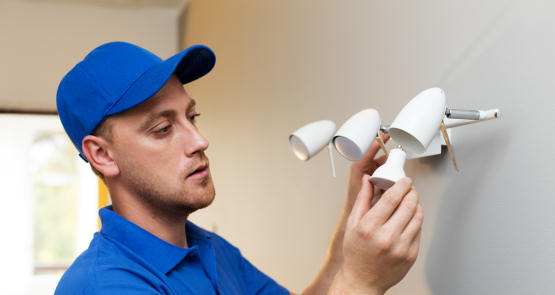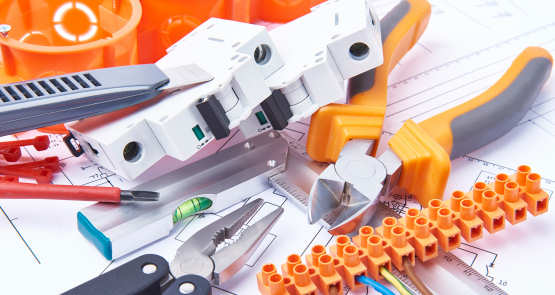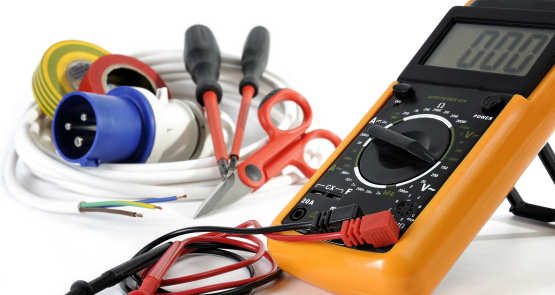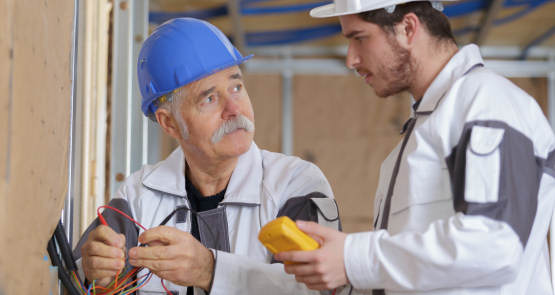Nothing in this world lasts forever and everything from time to time requires maintenance to keep it running smoothly. Very much like when you have your van or car serviced in the garage. It’s the same for your electrics; in carrying our regular maintenance will prevent problems before they become an issue as they are identified early.
Here at Acorn Electrical & Mechanical (AEM) we can provide you with a fully comprehensive maintenance service to cover all domestic and commercial sectors to ensure the smooth running of all your electrical systems and equipment.
We design tailor made services to suit your needs
We can design a routine planned maintenance contract tailored around your specifications requirements and needs to ensure any investment you have in a certain system.


Electrical maintenance comprises of:
Why it's so important to have electrical maintenance:
It does not matter who the original installer of your electrical systems were, we can help maintain it.
Good practice on electrical maintenance
Having a company provide you with a good maintenance service does not happen by accident. There are a few key points to achieve this.
What is maintenance?
When you change the brake pads on your car you are carrying out maintenance to your car. In the same way within a workplace it’s prudent to keep machines, equipment, appliances, and the main structure in good usable condition and safe. To do this may involve inspections, testing, repairs and even replacing broken parts. This is maintenance work.
Maintenance can be spilt into two categories:
Corrective maintenance – Is usually necessary when you have a breakdown and you need replacement parts quickly to get it working again. A bit like when your car breaks down you may need parts for it quickly to get it going as you need it for work.
Routine maintenance or preventative maintenance – This is planned maintenance at a specific time and date. It can be scheduled into a diary for a periodic inspection
Who is at risk most & effected?
This affects everyone. If the maintenance tasks are not assessed correctly and the correct controls are not initiated it can put the individual carrying out the maintenance at risk as they will be no certainty of their safety. But if maintenance is not carried out other people would be affected especially when working around large equipment and dangerous machinery with a precarious environment. It also makes sense to always use the same contractor to carry out your maintenance work, as familiarity with your systems and workplace is essential for safe maintenance. The statistics show that maintenance is dangerous. Between 25% to 30% of deaths are recorded in the UK’s manufacturing industry resulting from service maintenance.
Another factor to consider is long-term health issues resulting from performing maintenance such as workers being exposed to asbestos when carrying out maintenance duties in an area where asbestos is present.
Why is it Important?
Have scheduled regular maintenance is vital to maintain the business equipment; appliances, the building and ensuring the working environment remain safe and productive by simply removing workplace hazards. If you fail to perform maintenance then you run the risk of situations potentially dangerous leading to accidents, injury, health problems or worse death. It is vital that regular scheduled maintenance is planned and risk assessments are carried out prior to a task beginning.
What is statutory maintenance?
Statutory maintenance is law. Current legislation states that there are certain pieces of equipment that must be maintained at certain times or periodic times such as every 6 months, 12 months, 14 months or 26 months. The time period is dependant on the appliance or equipment in question.
What does the law state?
The Health & Safety at Work Act 1974 mainly covers maintenance work and outlines the guidelines, responsibilities and duty of care that employers must have so as to ensure a safe system of work, a safe place of work and safe working appliances or equipment.
The Management of Health & Safety at Work Regulations 1999 states that employers must carry out risk assessments on appliances or equipment prior to any maintenance work being carried out. This also applies for corrective maintenance when a repair is urgent.
Workplace Health, Safety & Welfare Regulations 1992 requires all employers to ensure and maintain their workspace area, appliances and equipment is in good condition, good repair and good working order.
The Provision & Use of Work Equipment Regulations 1998 requires employers to safeguard all working appliances and equipment is kept maintained efficiently, in good order of repair and in good working condition with a log book kept to show all service for appliances and equipment.


How often should I do this?
Maintenance frequencies are usually required to comply with specific rules and regulations that apply to specific activities in certain industries. Other maintenance activities such as PAT testing and electrical testing are defined after a basic risk assessment has been carried out.
What can be carried out?
PLANNING - You should always begin any maintenance by using a maintenance plan so you can put the correct planning in place. By involving staff and carrying out a risk assessment along with a maintenance plan you are using all of your resources to the best of your ability prior to maintenance beginning. Your maintenance plan can contain a list to include all appliances, plant and equipment that require maintenance. It should detail the maintenance required to each piece and the date it needs to be initiated. Its important to keep a detailed record of all the maintenance work you have performed.
USE CORRECT EQUIPMENT - Staff that is actively involved in the maintenance works must be equip with the correct tools and (PPE) personal protection equipment for the task ahead. Accidents happen usually when people try and improvise when not having the correct tools and equipment in the first place so its essential to get set up with all you need for the maintenance work in hand prior to starting work.
ENSURE THE WORKING AREA IS SAFE - Its always a good idea to isolate the work area to keep it clean and so unauthorised personal can be kept clear from the area ensuring its stays safe. Attach notice cards to items planned for maintenance to warn others that maintenance is planned so isolate the appliance.
PLAN WORK - Always work with the attitude of safe working procedures. Ensure all staff know and understand this so its applied to each appliance worked on even when time is short do not cut corners. Cutting corners and taking shortcuts will end in failure of the appliance and cost more in the long run to repair to ensure all staff know and read the written safe systems of work you have in place.
FINAL CHECKS & TESTING - Any equipment or appliance that have undergone maintenance needs to be tested and checked before it goes back into everyday use to ensure its safe to use. An external contractor can carry out these checks and testing if you do not have the correct testing equipment.
PERMITS ALLOCATED TO ALLOW WORK - Where there are high-risk areas of maintenance it usually will require a permit issued to allow work to be carried out in that area. These areas need a high level of management ensuring only competent personnel are used.
TRAINING - Training is important in a number of roles including maintenance issues. Staff should receive the necessary training to allow them to carry out any maintenance work correctly and safely. They need to have sufficient experience and the correct skills to deal with least expecting situations that may arise. This applies to your own staff or external contractors you use to carry out the works. Everyone must understand and except the safe sysytems of work standards for every job and adhere to them.
What are the primary risks?
Hazardous situation can arise when carrying out maintenance work. It can also increase the risk status of a working area when it’s being carried out. Its always prudent to carry out a risk assessment to identify any high risk elements so it can be controlled correctly.
Some high-risk problems are:
We can deliver:
Preventive maintenance
It’s always good to have a preventative electrical maintenance plan active and in place to cover all your High Voltage (HV) and Low Voltage (LV) power distribution outlets. This will reduce the risk of appliance failure and breakdown. When an appliance unexpectedly fails or breaks down it can cost you dearly. Not only the cost of repair but also the disruption to production and downtime that your business will suffer.
It is our recommendation that you draught up a maintenance plan for your power distribution outlets to safeguard that they continue to work correctly and safely. We have experienced technicians in High Voltage (HV) and Low Voltage (LV) transformer switchgear maintenance. Please feel free to give us a call on 01752 201077 where a member of our team will be happy to help.
Why Choose Acorn Electrical & Mechanical
We are based in Plymouth Devon so we cover the complete South West. We have a team of skilled electricians who are passionate about their work and have been doing it for over 15 years.
Our team offers:
Please feel free to call us for help or advice.
If you are interested in booking a survey for any of our services or just a safety check, please contact Acorn Electrical & Mechanical (AEM) and a member of our team will be happy to help or advise you. CALL now on 01752 201077 or 07779 777965

